BS Bureau in New Delhi
A Ranganathan, Aviation Safety Consultant
Could Baldauf have continued without a godfather's blessings? Was this the reason he was given the soft option of resigning instead of the sack, to protect his CV from being muddied?
A zero when turned around remains a zero.
When Gustav Baldauf was brought in as the chief operating officer in June 2009, the doosra that was bowled failed to deliver.
He resigned and his resignation was accepted.
The reason: Disciplinary action for criticising government policy, which could have resulted in sacking. Did the management protect his future by not sacking him?
. . .
Should Air India have sacked COO Baldauf?
When he joined, Baldauf played to the gallery by stating, "I know it is a different process. It is not a private company.
"But we definitely have systems in place. It is easier to work in a government environment. There is a big, big potential in this company."
He went on to say, "The stakeholder (the government) would tell the Board what it wants, and the Board in turn would tell the executive what to do.
"Everyone knows what the problem is. So we have to give them clear targets on which they will have to work and accomplish those targets."
He said plans had been put in place to achieve a turnaround for the organisation.
"We have to break it (the plan) into pieces and implement it." On the sidelines of an International Air Transport Association conference, Baldauf said.
. . .
Should Air India have sacked COO Baldauf?
Image: Air India's ticketing counter."We need to make a three-year plan for turning around Air India. We will have to put an operational and financial plan together to make a clear road map.
"All information on the turnaround will be shared with the employees first before we make it public. I will also work closely with the unions."
Did Baldauf live up to his words?
His two referees for this high-profile selection were Wolfgang Prock-Schauer, former chief executive officer of Jet and a fellow Austrian national, who did himself no credit during the Jet pilots' dispute and economic crisis, and Pawan Arora, who unceremoniously exited the Directorate General of Civil Aviation for falsifying his credentials.
Arvind Jadhav, the chairman and managing director of Air India, knew about Pawan Arora a good three weeks before the Board meeting to approve Baldauf's appointment.
. . .
Should Air India have sacked COO Baldauf?
Yet, he went ahead with the appointment and never questioned his credentials.
Baldauf brought in his own team on fancy wage packets when the airline was reeling under losses.
Arora was rewarded with the COO position in troubled Air India Charters Limited and Stephen Sukumar was brought in as Chief of Training.
Did Baldauf share this appointment process with the employees and the unions?
When the Arora appointment was thrown out by the independent board members, Baldauf and Jadhav were present.
Yet, they chose to let Arora continue in his position for another two months. Arora took several executive decisions with the CMD and COO's blessing.
Wasn't that a case of indiscipline by the two? Did the government need more reason to give marching orders?
. . .
Should Air India have sacked COO Baldauf?
In June 2009, Jadhav said Baldauf would closely monitor day-to-day operations and initiate efforts to restructure routes.
Where was Baldauf during the fiasco at Terminal 3 in New Delhi? Air India has slid to the fourth position in the aviation market in India during this short period.
The motivation and morale of all employees are at their lowest level. Baldauf seems to have worked closely only with his chosen team and ignored the employees.
Air India has not learnt a lesson from the Caribjet scam in which the airline lost crores owing to the very severe and unreasonable penalty clause that was signed. Yet, Baldauf and his team called for fresh tenders for aircraft and engine leasing.
. . .
Should Air India have sacked COO Baldauf?
Image: Air India's newly acquired Boeing 777-200 LR is on display at the tarmac of Mumbai airport.Photographs: Punit Paranjpe/Reuters
The airline that does not have funds to pay employees' salaries is venturing out into a costly scam again.
Who is responsible and accountable?
Meanwhile, the COO had plush offices, three of them refurbished at more than Rs 30 lakhs (Rs 3 million), and he spent weekends in Vienna.
Could he have continued in this fashion without the blessings of a godfather? Was this the reason he was given the soft option of resigning instead of the sack, to protect his CV from being muddied?
Does the buck stop with Baldauf or should it go to the CMD and his coterie? If the management of Air India had acted in September 2010, the airline would have been saved the blushes.
. . .
Should Air India have sacked COO Baldauf?
Image: Gustav Baldauf.Jitender Bhargava, former executive director, Air India
Baldauf's exit from Air India, though well-deserved, should have been on the grounds of lack of performance and not for stating in the media what is just and true
From his unexpected arrival in Air India to his ignominious departure, it is difficult to find any one thing about Gustav Baldauf that can be described as having been done the right way.
If his appointment in Air India for the onerous task of turning around the airline's fortunes was flawed, the manner of seeking his resignation was doubly flawed.
Baldauf wasn't the first employee of a government undertaking to have expressed a view not palatable to the government.
. . .
Should Air India have sacked COO Baldauf?
There have been many other instances but in almost all cases the defaulters have either been let off or at best reprimanded. Why did the government display exceptional high-handedness in the case of Baldauf?
The answer lies not in his having aired views in the media thus violating service conditions, but in the government's belated realisation that it had on hand a person to whom it was paying a handsome salary of Rs 3 crore (Rs 30 million) a year but was getting precious little by way of performance.
Baldauf's candid assertion that government regulations and interference did not allow him to deliver undoubtedly has enormous merit.
That government's meddling in Air India's day-to-day affairs has been one of the prime causes of Air India's current pitiable state is too well known a fact to be recounted.
. . .
Should Air India have sacked COO Baldauf?
Image: Inside an Air India flight.As Baldauf couldn't have been oblivious to this harsh reality when he took up this assignment, the alibi of government interference to justify lack of performance simply cannot wash.
It is apparent that the government after realising the folly of appointing Baldauf, particularly after the exit of Praful Patel from the civil aviation ministry, whose patronage he reportedly enjoyed, was looking for a pretext to get rid of him.
Considering that Baldauf had virtually nothing to show by way of performance on the operational front, the government should have logically dispensed with his services on that count rather than taking action on the specious plea of Baldauf having violated service conditions.
. . .
Should Air India have sacked COO Baldauf?
Baldauf's all-round lack of performance, including in areas in which there was no governmental interface, was evident to all.
In the nine-month period that he was with the national carrier, Air India's operational performance has only deteriorated.
In the domestic skies, Air India slipped from third to fourth position; the shift to T3 terminal was a grand fiasco; the product profile or quality of service showed no improvement whatsoever; no innovative work practices or systems were introduced in any operational field to enhance service standards or increase productivity of men and machines.
It is certainly not my desire to suggest that Baldauf alone should be held accountable for Air India's lacklustre performance even by its own standards in the recent past.
. . .
Should Air India have sacked COO Baldauf?
Praful Patel, Madhavan Nambiar, the then Civil Aviation Secretary who played an over-enthusiastic role in Baldauf's appointment, the Board members and Chairman Arvind Jadhav must take the blame for attempting an experiment of hiring the services of an under-qualified and inexperienced 'turnaround' manager which was doomed from Day 1.
Those responsible for selecting him ought to be asked to explain what they saw in Baldauf's track record to have found him eminently worthy of the challenging assignment with which he was entrusted.
The elapsed experimental time of nine months with him as COO has only seen the state of the airline worsening with more and more people now wanting to know if the airline has a future at all.
. . .
Should Air India have sacked COO Baldauf?
A modicum of credence can, thus, also now be given to the widespread speculation that ensuring Air India's gradual decline while 'appearing' to be doing its best to salvage Air India is all part of a grand design to eventually incapacitate Air India.
Unless Vayalar Ravi can negate such pernicious designs of people within and outside Air India, the national carrier that was once the nation's pride will only head towards an imminent crash landing sooner rather than later.
It is time those administering the airline took the bull by the horns rather than seek shelter under flimsy pretexts like they have taken for getting rid of Baldauf, whose exit from Air India, though well-deserved, should have been on the grounds of lack of performance -- to serve as a lesson to others -- and not for stating in the media what can only be described as just and true.
The government has clearly erred in its action.

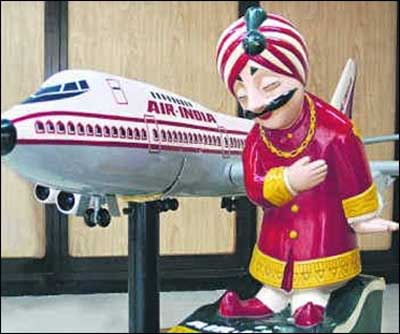
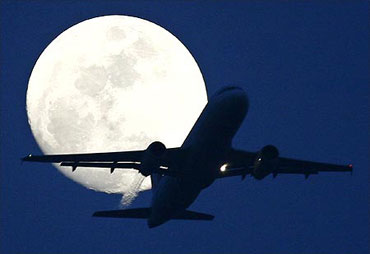
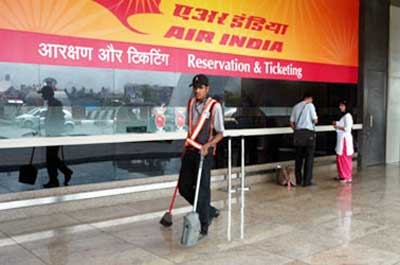
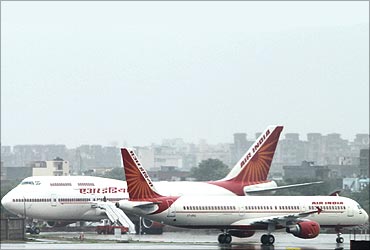
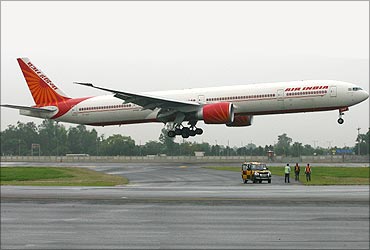
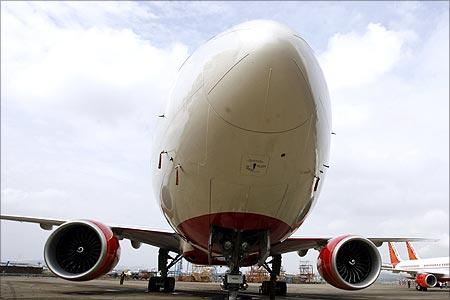
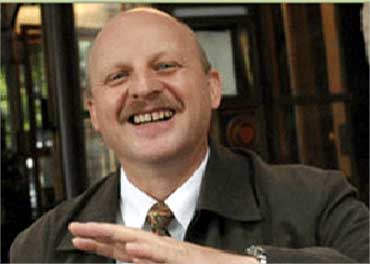
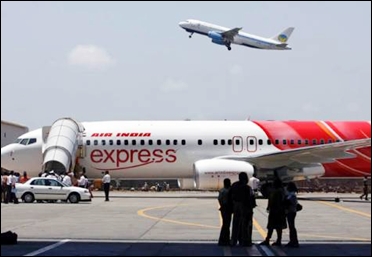
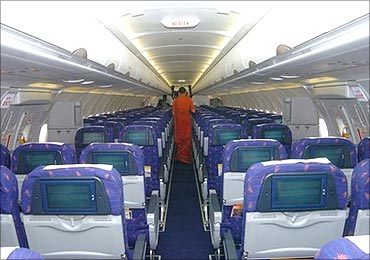
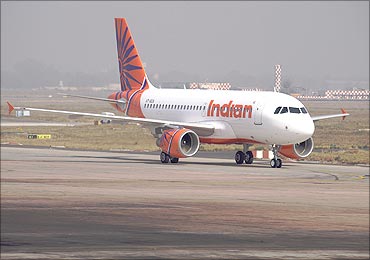
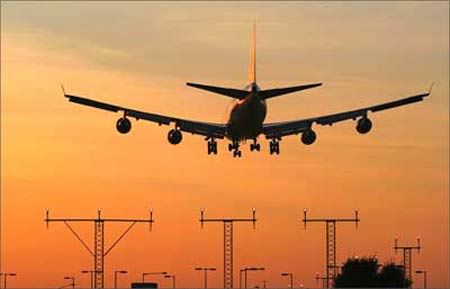
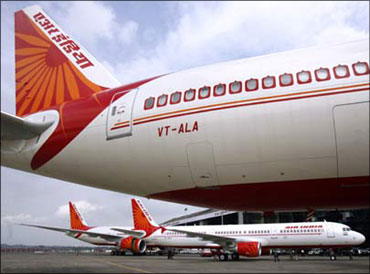

article